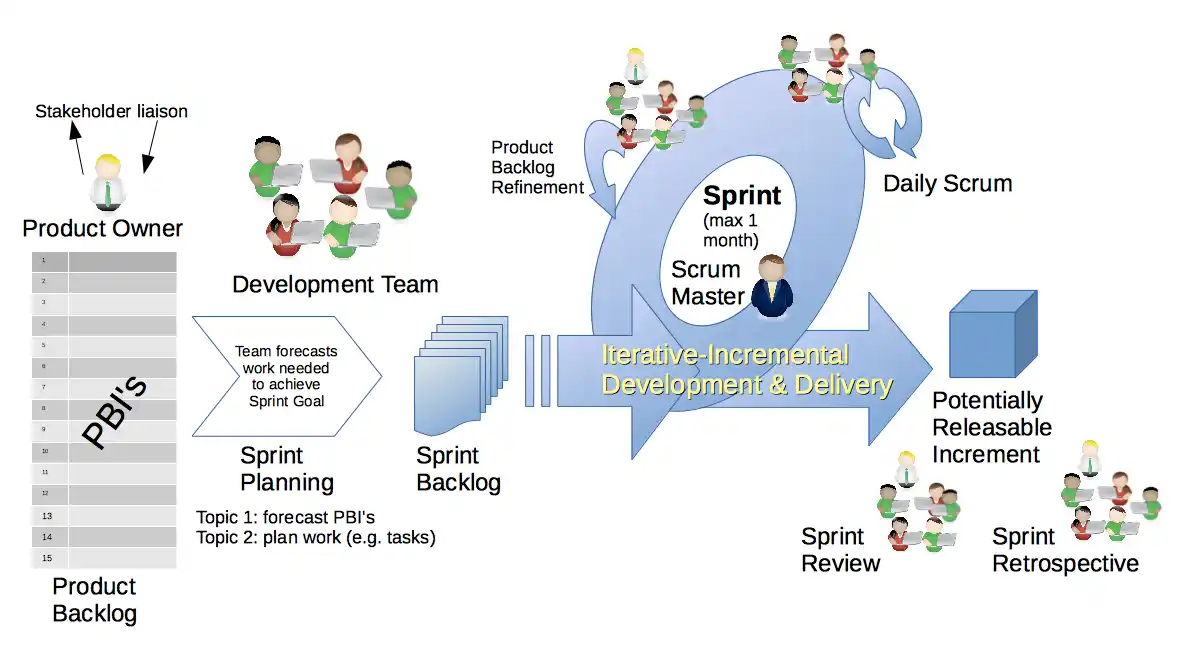What is a Scrum Master?
In the world of Agile project management, the Scrum Master plays a crucial role in ensuring smooth workflow and team collaboration. This guide explains the responsibilities, skills, and importance of a Scrum Master while covering key insights like certification, salary, and training.
What Does a Scrum Master Do?
It facilitates Agile methodologies within a team. Their primary responsibilities include:
- Ensuring adherence to Scrum principles.
- Removing obstacles that hinder progress.
- Improving team communication and efficiency.
- Coaching and guiding the team in Agile practices.
- Assisting with its tools, like JIRA and Confluence.
Key Skills
- Strong Communication Skills – Facilitates collaboration among stakeholders.
- Problem-Solving Abilities – Identifies and removes blockers.
- Leadership – Guides and supports team members.
- Knowledge of Agile Frameworks – Ensures best practices are followed.
- Technical Proficiency – Understanding of Agile tools and project management platforms.
Scrum Master vs. Project Manager: Understanding the Difference
Many people confuse a Project Manager but they serve different function:
- It focuses on Agile processes and team facilitation.
- A Project Manager handles project scope, budget, and timeline.
Why is a Scrum Master Important?
It helps Agile teams stay productive and focused. Their contributions lead to:
- Faster project delivery.
- Improved teamwork and morale.
- Higher product quality.
- Increased adaptability to changes.
Common Challenges Faced by Scrum Masters
While Scrum Masters play a vital role, they often encounter these challenges:
- Resistance to Agile adoption.
- Unclear roles and responsibilities.
- Managing conflicts within the team.
- Balancing stakeholder expectations.
How to Become a Scrum Master
Follow these steps to start your journey:
- Learn Agile and Scrum principles.
- Gain hands-on experience in an Agile environment.
- Obtain a Master certification (e.g., CSM, PSM).
- Develop leadership and facilitation skills.
- Continuously improve by staying updated on industry trends.
- Take part in Scrum Master training programs to gain practical insights.
Salary and Career Prospects
A career offers lucrative opportunities. The average Scrum Master salary varies by experience and location, but generally falls between $80,000 to $120,000 per year.
Scrum Master Interview Questions
If you are preparing for an interview, consider these common questions:
- What are the key responsibilities?
- How do you handle team conflicts in an Agile setting?
- Can you explain the difference between Scrum and other Agile methodologies?
- What are the most effective Scrum Master tools?
Scrum Master Resume Tips
When applying for the role, ensure your resume includes:
- Relevant certifications (CSM, PSM, SAFe SM, etc.).
- Experience with Agile tools like JIRA, Trello, and Confluence.
- Examples of how you’ve helped teams improve Agile processes.
Conclusion
A Scrum Master is essential for Agile success. By fostering collaboration, removing roadblocks, and ensuring best practices, they help teams achieve their goals efficiently. Whether you’re new to Agile or an experienced professional, becoming is a rewarding career choice.
Want to learn more about Agile methodologies and certification? Explore our latest resources today!
Trendzguruji.me Awareness: Empowering Knowledge
Trendzguruji.me Awareness is an initiative aimed at educating individuals on the latest trends, technologies, and important topics shaping the world today. With a focus on spreading valuable information, Trendzguruji.me covers a wide range of subjects, from technology and health to social awareness. The platform helps people stay informed and make better decisions in their everyday lives. Trendzguruji.me Awareness is committed to providing up-to-date, reliable insights, ensuring that readers are always aware of the changes happening around them. This initiative fosters informed communities, empowering them through knowledge and awareness.





